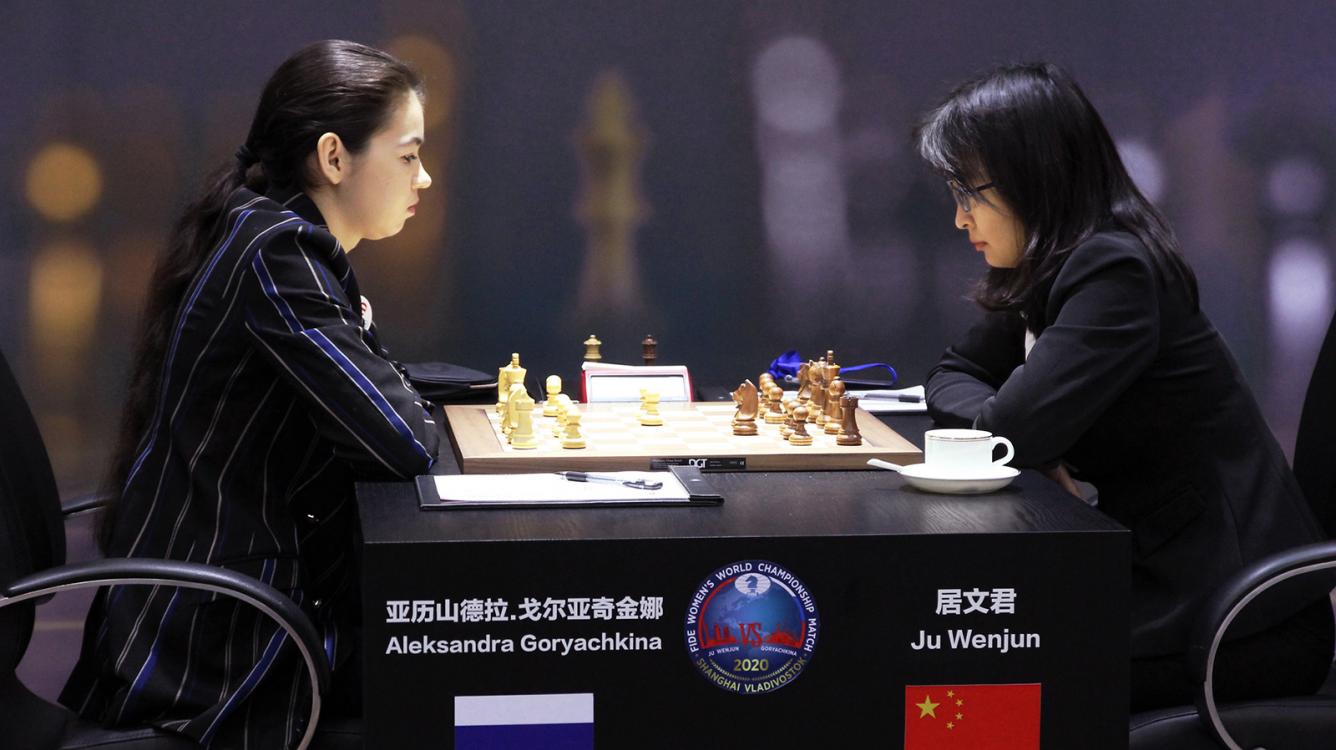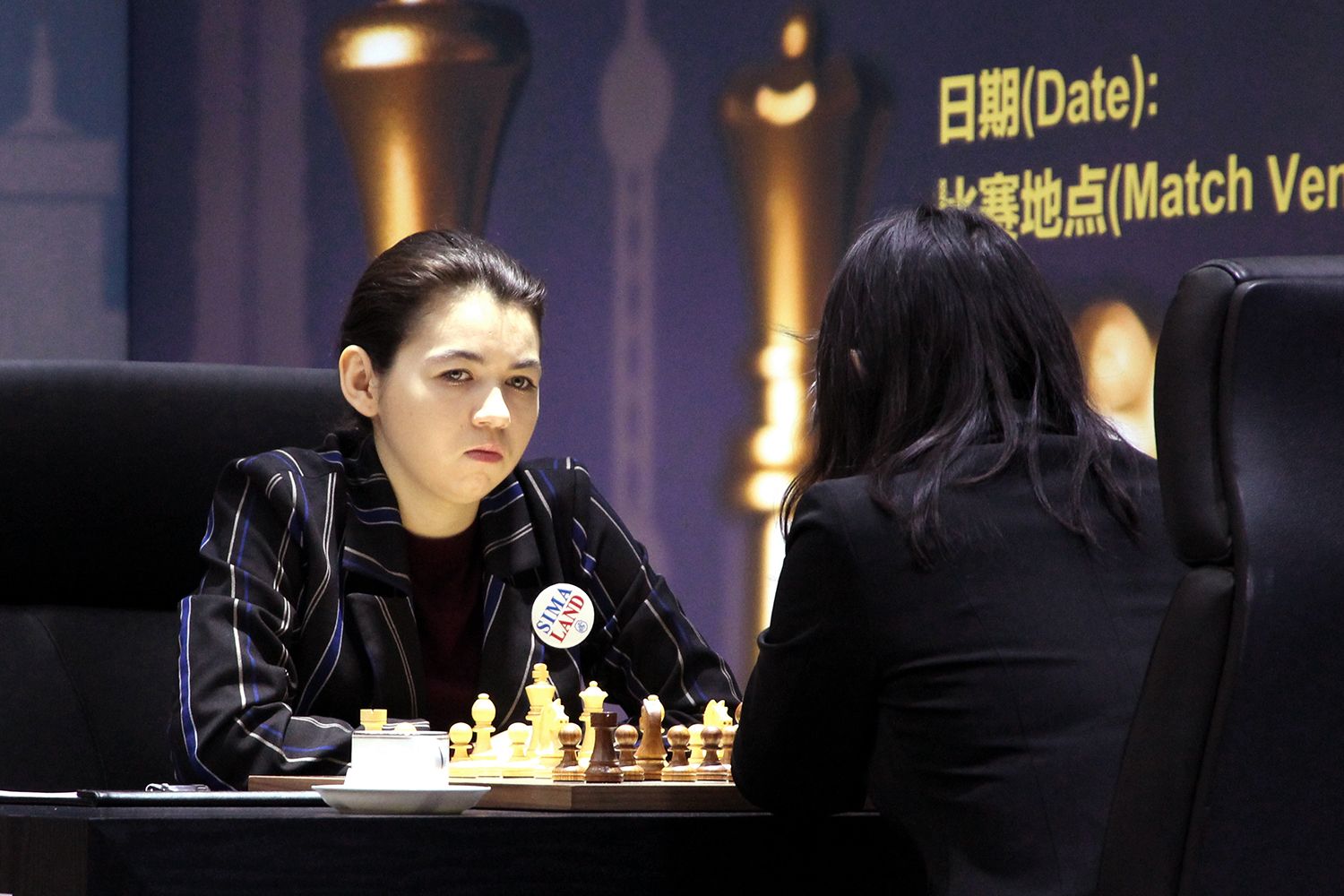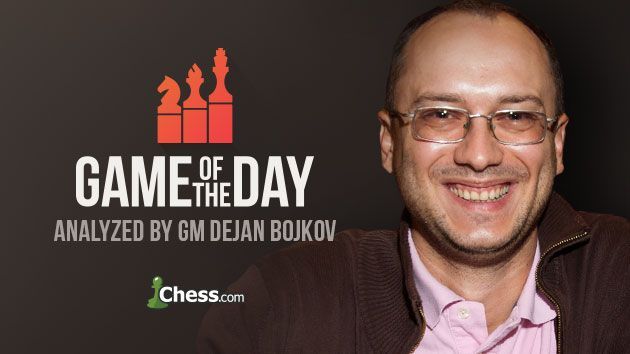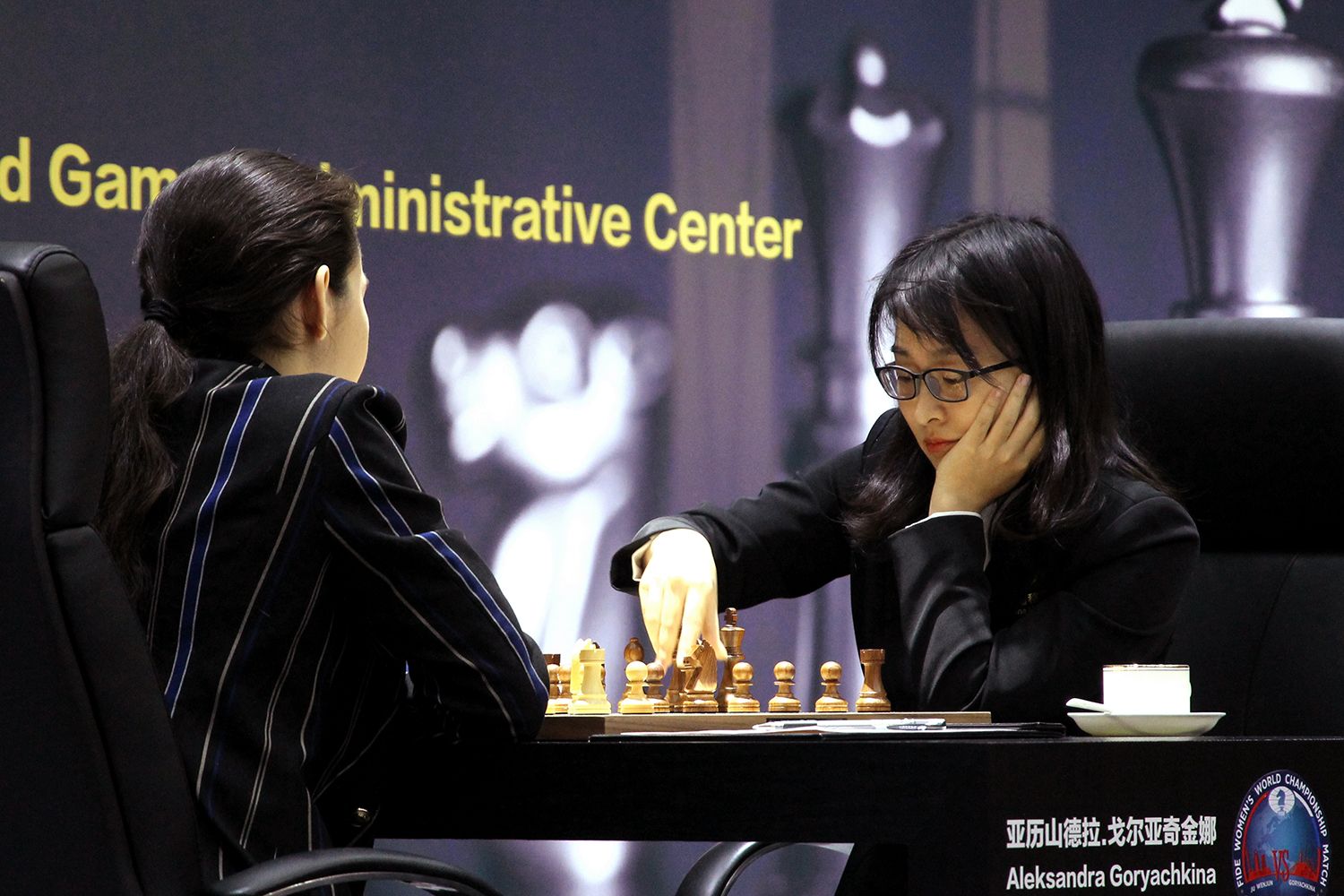
FIDE Women's World Chess Championship Starts With Draws
The 2020 Women's World Championship match between reigning champion Ju Wenjun (China) and challenger Aleksandra Goryachkina (Russia) started with two draws. After a rest day, play continues on Wednesday.
2020 Women's World Championship | Scores
| # | Fed | Name | Rtg | Perf | 1 | 2 | 3 | 4 | 5 | 6 | 7 | 8 | 9 | 10 | 11 | 12 | Score |
| 1 | Ju Wenjun | 2584 | 2578 | ½ | ½ | . | . | . | . | . | . | . | . | . | . | 1 | |
| 2 | Aleksandra Goryachkina | 2578 | 2584 | ½ | ½ | . | . | . | . | . | . | . | . | . | . | 1 |
The match, which has a prize fund of 500,000 euros, was officially opened on Jan. 4 with a ceremony and a press conference in the Shanghai Chess Center. The first game was played on Sunday and was a long, hard-fought draw that lasted 97 moves. Goryachkina tried her chances for a long time in an ending with a good knight vs. a not-so-great bishop.
The first move of the World Championship #WomenChessMatch was made by Ye Jiangchuan, President of the Chinese Chess Federation, and Alexandr Shmanevskiy, Consul General of the Russian Federation in Shanghai.
— International Chess Federation (@FIDE_chess) January 5, 2020
The first game Aleksandra Goryachkina vs Ju Wenjun ended in a draw. pic.twitter.com/WX1moKHJoF
The players started the game with an Open Catalan and played a topical line with an early queen trade. They followed earlier games for 13 moves, including Giri-Jakovenko, Shenzen 2019 and Ponomariov-Dominguez, Budva 2019.
Goryachkina kept a better pawn structure (two pawn islands vs. three!), and her minor piece became the better one when she could fix her opponent's pawns on light squares, which gave the Russian GM strong control over the dark ones.

After the rooks were traded, which Goryachkina could have postponed a bit longer, she tried an enormous amount of knight maneuvers (in fact, her queen's knight alone made 45 moves, or 46% of all moves) but eventually had to settle for a draw. Ju had been under pressure but held.


For her first game as White, Ju chose 1.e4. This move couldn't have come as a big surprise to Goryachkina. In 2019 the Chinese GM had played it 12 times compared to 20 times of playing 1.d4 and one time 1.c4, the latter against... Goryachkina at the Skolkovo Grand Prix in September 2019, their last game before this match.
Goryachkina played the Berlin and came well-prepared. Her 10...Nc4 against the still slightly odd-looking 10.Re2 (once introduced by Maxime Vachier-Lagrave and also played by Magnus Carlsen in a world championship match) is the latest trend. It was introduced almost a year ago by Mr. Berlin himself, Vladimir Kramnik, in what would be his last standard tournament.
Still, Ju might have missed a small chance on move 18, although selecting g2-g4 in front of your king is not easy at all in a world title match.

One of the officials in Shanghai is FIDE Vice President Nigel Short, who is both the chairman of the appeals committee and one of the commentators on the official broadcast. Danish grandmaster Peter Heine Nielsen suggested on Twitter that one aspect seems unchanged with the new FIDE leadership: It's still unclear how some positions, such as memberships on an appeals committee, are obtained.
In case you're wondering, the chairman of the appeals committee (which is only needed in case of disputes, which are extremely rare) earns 4,000 euros, and the two other members 3,000 euros each. They are GM Oleg Romanishin of Ukraine and IA Abd Hamid Bin And Majid of Malaysia.
Nigel ran an excellent campaign wanting to renew @FIDE_chess and @advorkovich made the election promise that the time of sinecure positions within FIDE would be over.
— Peter Heine Nielsen (@PHChess) December 31, 2019
During the previous administration they actually publicised the income for FIDE-board members annually. https://t.co/jiUP9KsOEj

FIDE Director General Emil Sutovsky commented to Chess.com:
"I am somewhat surprised to see that sort of criticism, while the appointments for an appeals committee have radically changed from the practice of the previous FIDE management. Contrary to recent history, when a small group of people was nominated time after time after time, we rotate it massively, and have representatives of all four continents and over 20 countries. The main criteria are a good reputation and a professional background."
Sutovsky said that the biggest number of seats in the different appeals committees were assigned to legendary (or famous) players of recent past or present. In the last year that list included Nona Gaprindashvili, Alexander Beliavsky, Johann Hjartarsson, Artur Jussupow, Lev Psakhis, Xie Jun, Mikhail Krasenkow, Oleg Romanishin, Ilia Smirin, Yuri Balashov, Darmen Sadvakassov, Igor Zaitsev, Alisa Galliamova, Eva Repkova, and Agnieszka Brustman.
Sutovsky added: "In order to make it more efficient, we have united two positions, and now the FIDE supervisor role is fulfilled by the chief of the appeals committee. Moreover, we got rid from appeals committees where possible, sparing organizers' expenses in the Women's Grand Prix Series and the FIDE Chess.com Grand Swiss where the appeals committees were composed of players."

Tuesday is a rest day, which is the case after each set of two games. After game six, there will be two extra free days when the match moves from Shanghai to Vladivostok.
The winner will earn 60 percent of the prize fund, and 40 percent will go to the runner-up. If the match ends in a tie after 12 games and a tiebreak decides matters, the winner will receive 55 percent and the runner-up, 45 percent.
The match is played over 12 standard games and, if needed, a rapid/blitz tiebreak. The time control for each game is 90 minutes for the first 40 moves, followed by 30 minutes for the rest of the game with an increment of 30 seconds per move starting from move one. A draw offer before move 40 is not allowed.
Previous report:


